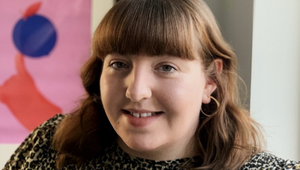
Katy Hopkins: “Iris Excels at Being a Bit Renegade”

Katy Hopkins joined Iris in September 2024 in the role of executive creative director, bringing with her 17 years of experience and a host of awards from the likes of Cannes Lions, Creative Circle, British Arrows, One Show, Kinsale Sharks and D&AD. Motivated by the desire to help creatives push to achieve great results, Katy found a kindred philosophy within Iris which, along with the agency’s renegade attitude to the work, convinced her to make the move.
In her role, Katy is tasked with crafting work that can reach consumers in a world where 79% of people don’t notice advertising. It’s something Iris has honed in on as a challenge to overcome through what the agency calls ‘participation’ – a focus on creating engaging, interactive, and participatory experiences that go beyond traditional advertising and make consumers an active part of the brand experience. This reorientation from passive to active is the key, according to Iris, to advertising that can’t be ignored.
LBB’s Zhenya Tsenzharyk sat down with Katy to talk about why awards matter – but not for the reasons we might think; the creative trends affecting the industry now, and why playing it safe isn’t going to work in a market where audiences can simply choose to not pay attention.
LBB> Why was becoming the ECD at Iris the right career move for you?
Katy> I've always been interested in Iris because, from the start of my career in advertising, it stood out for doing interesting, unconventional things. I’d always been curious about the agency, and after 10 years as a creative director, I was looking for a fresh challenge – something that would let me push boundaries, express my creative voice, and have more ownership over the work. I loved that Iris had a slightly renegade approach, which aligned with my passion for nurturing teams and helping them create the best work of their careers. At my previous role, I focused on identifying potential in creatives and pushing them to achieve great results, and when I spoke to Iris, its challenges and ambitions resonated with me.
Iris’ focus on crafting work that not only delivers bold, shareable ideas, but also excels in art direction made this opportunity exciting. Since joining, the pace has been intense, with no time to pause; it's always moving, always energised. I thrive in that kind of dynamic environment, and it’s been a fantastic experience so far.
LBB> In your view, what does Iris excel at creatively? On the other hand, what kind of changes are you excited to implement and make?
Katy> I think Iris excels at being a bit renegade, always looking for interesting and unconventional ways to talk about a brand or product, whether through technology, data, or other innovative approaches. What I find so compelling is the opportunity to take those unique ideas and ensure they are beautifully crafted and executed so they reach their full potential, resonating with and being enjoyed by everyone.
There have been quite a few changes, but the focus is really on harnessing the raw energy and joy and transforming it into something tangible and creatively impactful. It’s about channelling that enthusiasm in a way that delivers the best possible outcomes.
LBB> What are some opportunities and capabilities that you’d like Iris to lean into in the future?
Katy> I think one of the big focuses is on creating more big ideas and compelling storytelling, whether it’s for social, out-of-home, or internal brand narratives. It’s about crafting stories that allow our brands and clients to move across different sectors and mediums while staying connected to their core. With Iris’ deep understanding of social and the growing client demand for earned media, it’s about not just delivering great social content, but ensuring it’s backed by strong, versatile ideas that can work across any platform.
LBB> You’ve won a lot of awards throughout your career. How important are awards to you and the work you do? Does it ever pay off for creatives to chase awards?
Katy> I think awards are really important, but probably not for the reasons most people might think. Awards bring attention to an agency in a way that even the work itself doesn’t always manage to do. Winning an award shows that great work has been created, and that recognition makes clients see the agency differently and gives staff a renewed sense of pride.
One of the things I’d like to help Iris with is regaining the confidence it had a few years ago, and awards can play a big role in that—not just for the shiny trophies, but for the impact on people. They make employees more confident, help with staff retention, attract new talent, and encourage everyone to push creative work even further. It’s about creating a culture where belief in the agency leads to even greater work.
Great creative work has the power to move you—it can make you laugh, cry, or even choose to do something you wouldn’t have otherwise considered. It’s the kind of work that makes your mum say, ‘Wow, that’s amazing’, without needing to understand awards jargon, because the work itself resonates. Ultimately, the goal shouldn’t be to win awards, but to focus on creating truly exceptional work—and the awards will naturally follow.
LBB> Iris’s website states that “Today, 79% of people don’t notice advertising” – can you delve into this a little more? What’s the state of the market right now?
Katy> One of the ongoing challenges in advertising is that much of the work remains mediocre—simply ticking all the boxes on a brief without questioning its real impact. We need to create work that stands out, whether on TikTok or a billboard, and truly grabs attention—work that people want to engage with rather than simply avoiding. In today’s world, where people actively avoid ads, we must ensure we're having meaningful conversations with audiences that they want to engage in, rather than just broadcasting messages to them.
LBB> What kind of influence does data have on creativity? Do you see it as an aid or a hindrance to what you do?
Katy> Data is definitely a valuable aid when used properly, as it can inform and guide the creative process. However, the focus should always remain on the ideas and storytelling, as that’s what really grabs people’s attention. While data can help uncover insights and make the work more personable, it’s the joy and entertainment from great storytelling that gives the work its hook and makes people want to engage.
LBB> What are some current creative trends that you think have staying power? And which ones are a fad?
Katy> Nostalgia is an interesting factor, especially when you look at generational shifts. For instance, I read that around 50% of gen z wants to disconnect from their phones, and a large percentage of them are actively trying to limit screen time. This sparks a conversation about the digital environment they’ve grown up in, especially when you compare them to gen alpha. Half of gen alpha is extremely socially aware and native to technology, while the other half is being kept away from it by parents. This creates a unique situation where, for the first time, you’ll have a generation split between those who are digitally literate and those who are kept away from technology until a certain point. It’s more of an observation than a trend, but it will be fascinating to see how this dynamic evolves over time.
AI is definitely here to stay as a tool that brands can leverage, but how it integrates with humanity and culture will determine its true relevance. For brands to use it effectively, it has to be embedded in a way that makes sense culturally. Some brands are hesitant about adopting AI, particularly due to concerns over intellectual property, which will be an interesting challenge moving forward. But ultimately, AI will continue to grow and evolve in various ways. As for humour, it’s making a comeback, and I hope it stays because humour is not only a powerful tool for memory, but also something everyone can appreciate.
LBB> What kind of work are you most excited about right now or would like to be doing more of?
Katy> Good storytelling, especially when it’s funny, resonates deeply with audiences. Brands like Liquid Death, with its aluminum cans, have made a significant impact in a humorous yet meaningful way, while CeraVe’s work, though not necessarily making a direct difference, still stands out for its clever, entertaining approach.
I think for brands to truly stand out, they need to take risks and do something different, just like e.l.f., which has built its success on constant innovation. Whether through comedy, making a positive impact, or taking bold actions, brands must stand for something to capture attention and spark conversation, and that’s what I aim to create in the coming years.
LBB> Is ‘playing it safe’ no longer a strategy that brands can rely on?
Katy> Playing it safe can work for category leaders, as they have an established reputation, but for many of the brands we work with at Iris, being the ‘interesting little brother’ is key. These brands need to do something exciting and different to stand out and spark conversation, because while the top player may coast, the second-place brand has to work much harder to capture attention.















